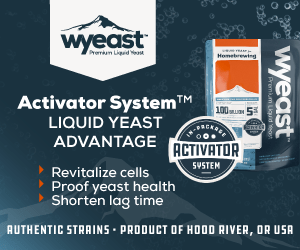Ship’s Cat Dark Mild
Ship’s Cat Dark Mild
(5 gallons/19 L*, all-grain)
OG = 1.035 FG = 1.010
IBU = 24 SRM = 24 ABV = 3.2%
It is rare for me to brew the exact same recipe twice; I tend to make tweaks and adjustments even to ones I like. But I brew this recipe every late spring in time for session drinking over the summer
because I love it so much.
*Please note that this recipe is for 5 gallons (19 L), as is standard for BYO.
If you want to fill a pin-sized cask, I suggest increasing the quantities by 10%.
If you want to fill a pressure barrel, increase the quantities by 20%.
Ingredients
5.7 lbs. (2.6 kg) Maris Otter pale ale malt
1 lb. (454 g) medium crystal malt (60 °L)
7.6 oz. (215 g) chocolate malt (425 °L)
4.7 AAU First Gold hops (60 min.) (0.5 oz./14 g at 9.5% alpha acids)
3.6 AAU Tettnang hops (15 min.) (1.1 oz./31 g at 3.4% alpha acids)
1⁄2 tsp. (0.6 g) Irish moss
Silica sol
7.2 fl. oz. (213 mL) isinglass (optional)
SafAle S-04 or your favorite English ale yeast
0.9 oz. (25 g) sugar
Step by step
Mash all of the malt at around 152 °F (67 °C) for one hour. Collect 6 gallons (23 L) of wort in the kettle and boil for one hour, adding the First Gold hops after 15 minutes, and then the Tettnang hops and Irish moss after 45 minutes. At the end of the boil, chill to 68 °F (20 °C) and then transfer to your fermenter and pitch the yeast. After five days, add the silica sol fining according to the manufacturer’s instructions and then chill to 41 °F (5 °C) or below for two days. If filling a single container (e.g. a pin cask or pressure barrel), dissolve the sugar in the smallest amount of boiled water as you can, add this to the container and then rack the beer onto it. Add the isinglass (if using for the purpose of clarification) directly to the container while the beer is being racked. Seal the container and condition at 68 °F (20 °C) for at least two weeks before serving.
Ship’s Cat Dark Mild
(5 gallons/19 L*, extract with grains)
OG = 1.035 FG = 1.010
IBU = 24 SRM = 24 ABV = 3.2%
*Please note that this recipe is for 5 gallons (19 L), as is standard for BYO.
If you want to fill a pin-sized cask, I suggest increasing the quantities by 10%.
If you want to fill a pressure barrel,
increase the quantities by 20%.
Ingredients
4 lbs. (1.8 kg) Maris Otter liquid malt extract
1 lb. (454 g) medium crystal malt (60 °L)
8 oz. (230 g) chocolate malt (425 °L)
4.7 AAU First Gold hops (60 min.) (0.5 oz./14 g at 9.5% alpha acids)
3.6 AAU Tettnang hops (15 min.) (1.1 oz./31 g at 3.4% alpha acids)
1⁄2 tsp. (0.6 g) Irish moss
Silica sol
7.2 fl. oz. (213 mL) isinglass (optional)
SafAle S-04 or your favorite English ale yeast
0.9 oz. (25 g) sugar
Step by step
Place caramel and chocolate malt into a steeping bag and submerge in 6 gallons (23 L) of water at or near 155 °F (68 °C). After 20 minutes of steeping, remove the grain bag, then bring the wort up to a boil. When boil is achieved, take the kettle off the flame and add the extract while stirring. Once extract is fully dissolved return to the heat source and boil for 60 minutes, adding the hops as indicated.
At the end of the boil, chill to 68 °F (20 °C) and then transfer to your fermenter and pitch the yeast. After five days, add the silica sol fining according to the manufacturer’s instructions and then chill to 41 °F (5 °C) or below for two days. If filling a single container (e.g. a pin cask or pressure barrel), dissolve the sugar in the smallest amount of boiled water as you can, add this to the container and then rack the beer onto it. Add the isinglass (if using for the purpose of clarification) directly to the container while the beer is being racked. Seal the container and condition at 68 °F (20 °C) for at least two weeks before serving.
Tips for success:
Anyone who is vegan will want to know that isinglass is obtained from bladders of fish. Sadly, isinglass is pretty essential if people want their beer to be crystal clear in 24 hours. As much as I wish silica sol could do this on its own, experience tells me that it simply doesn’t (I’m actually vegan and have spent the last three years trying to find a good way of replacing isinglass in casks and so far I have failed). The addition of isinglass is optional but not using it may result in hazy beer.
Written by Ben Martin




